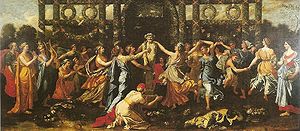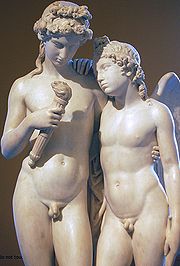
Hymenaios
Encyclopedia

Greek mythology
Greek mythology is the body of myths and legends belonging to the ancient Greeks, concerning their gods and heroes, the nature of the world, and the origins and significance of their own cult and ritual practices. They were a part of religion in ancient Greece...
, Hymen (Ancient Greek: ) was a god of marriage
Marriage
Marriage is a social union or legal contract between people that creates kinship. It is an institution in which interpersonal relationships, usually intimate and sexual, are acknowledged in a variety of ways, depending on the culture or subculture in which it is found...
ceremonies, inspiring feasts and song. Related to the god's name, a hymenaios is a genre of Greek lyric poetry sung during the procession of the bride to the groom's house in which the god is addressed, in contrast to the Epithalamium
Epithalamium
Epithalamium refers to a form of poem that is written specifically for the bride on the way to her marital chamber...
, which was sung at the nuptial threshold. The god is also sometimes called Hymenaios by metathesis.
Function
Hymen was supposed to attend every wedding. If he didn't, then the marriage would supposedly prove disastrous, so the Greeks would run about calling his name aloud. He presided over many of the weddings in Greek mythologyGreek mythology
Greek mythology is the body of myths and legends belonging to the ancient Greeks, concerning their gods and heroes, the nature of the world, and the origins and significance of their own cult and ritual practices. They were a part of religion in ancient Greece...
, for all the deities and their children.
Hymen was celebrated in the ancient marriage song of unknown origin (called a Hymenaios) Hymen o Hymenae, Hymen delivered by G. Valerius Catullus. Both the term hymn
Hymn
A hymn is a type of song, usually religious, specifically written for the purpose of praise, adoration or prayer, and typically addressed to a deity or deities, or to a prominent figure or personification...
and hymen
Hymen
The hymen is a membrane that surrounds or partially covers the external vaginal opening. It forms part of the vulva, or external genitalia. The size of the hymenal opening increases with age. Although an often practiced method, it is not possible to confirm with certainty that a girl or woman is a...
are derived from this celebration.
Representation

Italian Renaissance
The Italian Renaissance began the opening phase of the Renaissance, a period of great cultural change and achievement in Europe that spanned the period from the end of the 13th century to about 1600, marking the transition between Medieval and Early Modern Europe...
, Hymen was generally represented in art as a young man wearing a garland of flowers and holding a burning torch in one hand.
Sources
Hymen was mentioned in EuripidesEuripides
Euripides was one of the three great tragedians of classical Athens, the other two being Aeschylus and Sophocles. Some ancient scholars attributed ninety-five plays to him but according to the Suda it was ninety-two at most...
's The Trojan Women
The Trojan Women
The Trojan Women is a tragedy by the Greek playwright Euripides. Produced during the Peloponnesian War, it is often considered a commentary on the capture of the Aegean island of Melos and the subsequent slaughter and subjugation of its populace by the Athenians earlier in 415 BC , the same year...
, where Cassandra
Cassandra
In Greek mythology, Cassandra was the daughter of King Priam and Queen Hecuba of Troy. Her beauty caused Apollo to grant her the gift of prophecy...
says:
He is also mentioned in Virgil
Virgil
Publius Vergilius Maro, usually called Virgil or Vergil in English , was an ancient Roman poet of the Augustan period. He is known for three major works of Latin literature, the Eclogues , the Georgics, and the epic Aeneid...
's Aeneid
Aeneid
The Aeneid is a Latin epic poem, written by Virgil between 29 and 19 BC, that tells the legendary story of Aeneas, a Trojan who travelled to Italy, where he became the ancestor of the Romans. It is composed of roughly 10,000 lines in dactylic hexameter...
and in five plays by William Shakespeare
William Shakespeare
William Shakespeare was an English poet and playwright, widely regarded as the greatest writer in the English language and the world's pre-eminent dramatist. He is often called England's national poet and the "Bard of Avon"...
: Hamlet
Hamlet
The Tragical History of Hamlet, Prince of Denmark, or more simply Hamlet, is a tragedy by William Shakespeare, believed to have been written between 1599 and 1601...
, The Tempest, Much Ado about Nothing
Much Ado About Nothing
Much Ado About Nothing is a comedy written by William Shakespeare about two pairs of lovers, Benedick and Beatrice, and Claudio and Hero....
, Titus Andronicus
Titus Andronicus
Titus Andronicus is a tragedy by William Shakespeare, and possibly George Peele, believed to have been written between 1588 and 1593. It is thought to be Shakespeare's first tragedy, and is often seen as his attempt to emulate the violent and bloody revenge plays of his contemporaries, which were...
, and As You Like It
As You Like It
As You Like It is a pastoral comedy by William Shakespeare believed to have been written in 1599 or early 1600 and first published in the folio of 1623. The play's first performance is uncertain, though a performance at Wilton House in 1603 has been suggested as a possibility...
, where he joins the couples at the end —
- "'Tis Hymen peoples every town;
- High wedlock then be honoured.
- Honour, high honour, and renown,
- To Hymen, god of every town!"
Hymen also appears in the work of the 6th- to 7th-century Greek poet Sappho
Sappho
Sappho was an Ancient Greek poet, born on the island of Lesbos. Later Greeks included her in the list of nine lyric poets. Her birth was sometime between 630 and 612 BC, and it is said that she died around 570 BC, but little is known for certain about her life...
(translation: M.L. West, Greek Lyric Poetry, Oxford University Press):
- High must be the chamber –
- Hymenaeum!
- Make it high, you builders!
- A bridegroom's coming –
- Hymenaeum!
- Like the War-god himself, the tallest of the tall!
He was the son of Dionysus/Bacchus
Dionysus
Dionysus was the god of the grape harvest, winemaking and wine, of ritual madness and ecstasy in Greek mythology. His name in Linear B tablets shows he was worshipped from c. 1500—1100 BC by Mycenean Greeks: other traces of Dionysian-type cult have been found in ancient Minoan Crete...
(god of revelry) and Aphrodite
Aphrodite
Aphrodite is the Greek goddess of love, beauty, pleasure, and procreation.Her Roman equivalent is the goddess .Historically, her cult in Greece was imported from, or influenced by, the cult of Astarte in Phoenicia....
(goddess of love); or, in some traditions, Apollo
Apollo
Apollo is one of the most important and complex of the Olympian deities in Greek and Roman mythology...
and one of the Muses.
Other stories give him a legendary origin. In one of the surviving fragments of the Megalai Ehoiai
Megalai Ehoiai
The Megalai Ehoiai or Great EhoiaiThe poem is also referred to with alternate Latin transliterations of the title: Megalae Ehoeae or Eoeae; occasionally the Latin translation of Megalai is also found: e.g. Magnae Eoeae...
attributed to Hesiod
Hesiod
Hesiod was a Greek oral poet generally thought by scholars to have been active between 750 and 650 BC, around the same time as Homer. His is the first European poetry in which the poet regards himself as a topic, an individual with a distinctive role to play. Ancient authors credited him and...
, it's told that Magnes
Magnes
Magnes may refer to:* Macarius Magnes, bishop of Magnesia* Judah Leon Magnes , rabbi** Judah L. Magnes Museum, a Jewish museum in Berkeley, California, named after the rabbi* Magnes , the fifth solo album released by Reni Jusis...
"had a son of remarkable beauty, Hymenaeus. And when Apollo saw the boy, he was seized with love for him, and wouldn't leave the house of Magnes".
Aristophanes
Aristophanes
Aristophanes , son of Philippus, of the deme Cydathenaus, was a comic playwright of ancient Athens. Eleven of his forty plays survive virtually complete...
' Peace ends with Trygaeus and the Chorus singing the wedding song, with the repeated phrase "Oh Hymen! Oh Hymenaeus!" http://www.web-books.com/Classics/Nonfiction/Drama/Aristophanes/Peace/Aristophanes_PeaceP12.htm, a typical refrain for a wedding song.
Later story of origin
According to a later Romance, Hymen was an Athenian youth of great beauty but low birth who fell in love with the daughter of one of the city's wealthiest men. Since he couldn't speak to her or court her, due to his social standing, he instead followed her wherever she went.Hymen disguised himself as a woman in order to join one of these processions, a religious rite at Eleusis where only women went. The assemblage was captured by pirates, Hymen included. He encouraged the women and plotted strategy with them, and together they killed their captors. He then agreed with the women to go back to Athens
Athens
Athens , is the capital and largest city of Greece. Athens dominates the Attica region and is one of the world's oldest cities, as its recorded history spans around 3,400 years. Classical Athens was a powerful city-state...
and win their freedom, if he were allowed to marry one of them. He thus succeeded in both the mission and the marriage, and his marriage was so happy that Athenians instituted festivals in his honour and he came to be associated with marriage.
Sources
- Leonhard Schmitz, "Hymen." A dictionary of Greek and Roman biography and mythology, William Smith, editor. (11.57).
- P. Maas, "Hymenaios" REF 9 (1916) pp. 130–34.
- OvidOvidPublius Ovidius Naso , known as Ovid in the English-speaking world, was a Roman poet who is best known as the author of the three major collections of erotic poetry: Heroides, Amores, and Ars Amatoria...
. MedeaMedeaMedea is a woman in Greek mythology. She was the daughter of King Aeëtes of Colchis, niece of Circe, granddaughter of the sun god Helios, and later wife to the hero Jason, with whom she had two children, Mermeros and Pheres. In Euripides's play Medea, Jason leaves Medea when Creon, king of...
and MetamorphosesMetamorphoses (poem)Metamorphoses is a Latin narrative poem in fifteen books by the Roman poet Ovid describing the history of the world from its creation to the deification of Julius Caesar within a loose mythico-historical framework. Completed in AD 8, it is recognized as a masterpiece of Golden Age Latin literature...
, 12. - VirgilVirgilPublius Vergilius Maro, usually called Virgil or Vergil in English , was an ancient Roman poet of the Augustan period. He is known for three major works of Latin literature, the Eclogues , the Georgics, and the epic Aeneid...
. AeneidAeneidThe Aeneid is a Latin epic poem, written by Virgil between 29 and 19 BC, that tells the legendary story of Aeneas, a Trojan who travelled to Italy, where he became the ancestor of the Romans. It is composed of roughly 10,000 lines in dactylic hexameter...
, 1 - CatullusCatullusGaius Valerius Catullus was a Latin poet of the Republican period. His surviving works are still read widely, and continue to influence poetry and other forms of art.-Biography:...
, Poem 62.

